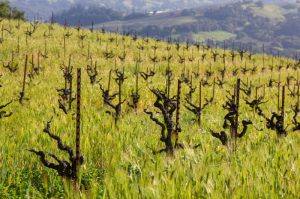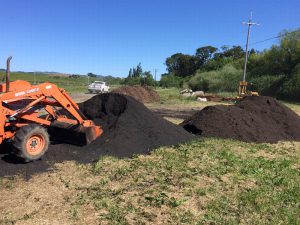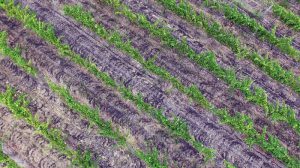
A robust cover crop has grown at this vineyard location after the addition of biochar.

Biochar mixed with compost, ready for vineyard application.

Vineyard rows receive a top-dressing of biochar mixed with compost.
The Benefits of Biochar
The use of biochar has the potential to provide the same or better vine growth with less fertilizer and nutrient inputs, and with less irrigation water, and that is the goal. It can also provide longer-term carbon benefits…the life in the soil is what it’s all about for us.
- Joseph Brinkley, Vineyard Manager, Bonterra,“Vineyards Experiment with Biochar as Soil Amendment”
Water conservation can be a long-term game but nitrogen is very immediate; it’s easily lost and critically important. Charcoal is a filter - it has a high surface area and adsorptive surface, binding nutrients in a way that is mostly plant available yet resistant to loss through volatilization or leaching.
- Josiah Hunt, CEO, Pacific Biochar
A one-time application could have an impact on the soil that lasts for 500 years.
- Charles Schembre, Vineyard Conservation Coordinator, Napa County RCD
In most every case biochar and compost together are better than either alone. When biochar and compost cure for a month or more we see increased benefits. But even without curing, a biochar blend is still better than raw - increasing and extending the benefits of the compost, with almost immediate reductions in ammonia smell.
- Josiah Hunt, CEO, Pacific Biochar
Biochar and compost can provide benefits if you have soil nutrient issues or low organic matter. Biochar can increase nutrient availability, soil organic carbon and water availability or water holding capacity, depending on the type of soil.
- Charles Schembre, Vineyard Conservation Coordinator, Napa County RCD
Napa Green is about producing wine responsibly and being proud of our respect for the environment and for future generations.
- Elizabeth Vianna, Chimney Rock Winery
